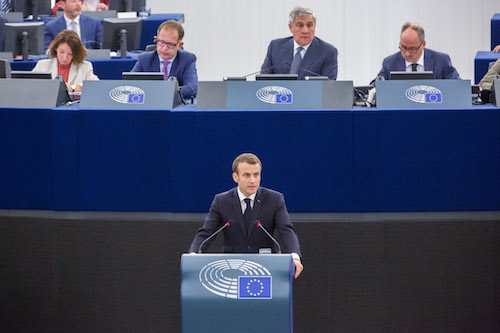24 April 2018
Carbon price floor: for a coordinated floor price at the European regional level


While the CO2 emissions are increasing again across Europe, Emmanuel Macron seized the topic and just recalled, at the European Parliament last week, that it is essential to reopen the debate on a carbon price floor in Europe. If today the CO2 price on the EU-ETS market has risen above €10/tCO2, it is however still a far too weak economic signal in the light of the EU’s climate ambitions. The option of a carbon price floor is thus a necessary instrument to give stakeholders visibility and to boost efforts in terms of transformation in favour of a less emitting economy…
The fight against climate change is still too often hindered by insufficient incentivizing public policies
However, in the European electricity generation sector, sources of low-cost decarbonisation are easy to reach, in particular to shift the merit order between coal-fired power plants and gas-fired power plants. A price-floor-type tool, specific to the electricity sector and set at €30/tC02, would make it possible to achieve this objective in a sustainable way: it is precisely the proposal made by the President of the French Republic during its speech at the plenary session of the European Parliament last Tuesday, at the occasion of a debate about the future of the European Union.
A pragmatic approach for an ambitious objective
If the floor price were applied across Europe, such a measure would reduce European emissions by 100 million tonnes of C02 per year. The unanimity required from all 28 Member States is far from being achieved, as economic, industrial, social and technological issues are antagonistic. This is why pragmatism must take precedence to initiate a virtuous process. Thus, as a first step, voluntary Member States could set national floor prices, coordinated at the regional level. Since 2013, the United Kingdom has had such a mechanism and is one of the only countries in Europe to have seen a decrease of its carbon emissions[[According to EDGAR data from the report “Key climate figures: France, Europe and World”, 2018 edition from the High Commission for Sustainable Development (CGDD), the United Kingdom achieved between 2014 and 2015 a 4% decrease of the CO2 emissions, whereas these increased in Europe (+ 1.3%).]]. The Netherlands has announced its intention to do the same, while France and Germany would also consider a common scheme on their side.
The potential dynamic of the Franco-German couple
Projections show that the implementation of a floor price of €30/tCO2, common only in the France-Germany area, could lead to a net emission reduction for the whole Europe of 40 million tonnes of CO2 each year. With this measure, France and Germany would therefore assume a strong European climate leadership and their example, as well as that of countries that already implemented or announced a floor price, could gradually lead to a growing number of EU countries wishing to effectively take their responsibilities in the necessary fight against climate change.
A Franco-German carbon price floor for the electricity generation sector would bring both climate and economic benefits, provided necessary conditions are respected. Indeed, it would generate a significant reduction in CO2 while guaranteeing a surplus of revenues, estimated at around €450m million/year for France and €5 billion/year for Germany. A share of the unblocked budgetary resources could thus be used for the necessary social and industrial support measures.
Essential accompanying measures
If limited to the sole Franco-German area, the floor price would have obvious consequences on the electricity sector itself. In order not to penalize gas-fired power plants located in France and Germany compared to those in other European countries, the implementation of this tool should be progressive, as the initiative will gradually expand to other countries.
The consequences for coal-fired power plants will be both social and economic. They must absolutely be anticipated and addressed. Compensation for electricity producers affected by this public policy and fundings of new industrial projects on the sites concerned should also be foreseen.
In addition, in order for the measure to be neutral on the EU allowance price, it is proposed that voluntary states buy back and cancel the volumes of quotas that would be saved by the electricity sector.
Finally, because wholesale electricity prices would necessarily increase (by around €4/MWh in France and €10/MWh in Germany), compensatory measures will be necessary to support electro-intensive industries that are exposed to international competition, building upon what already exist on the EU-ETS market and what has been implemented in the United Kingdom.
UFE considers that a carbon price floor for the electricity sector, coordinated at the European regional level, is a key opportunity to accelerate the decarbonisation of the economy. Following the United Kingdom and the Netherlands, its joint implementation in France and Germany, followed by its gradual extension at the regional level, would be a strong signal for all stakeholders, provided that necessary accompanying measures are implemented.
Find out more
02 June 2020
“Long live Europe”: it’s time for Europe!
25 February 2020
Brexit: love last 47 years


About us
The Union of the French Electricity Industry is the trade association of the French electricity sector. We bring together companies from the whole value chain of the electricity industry.
Find out more









